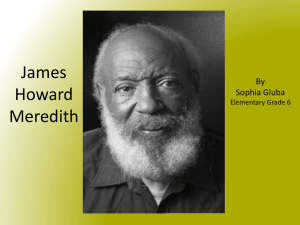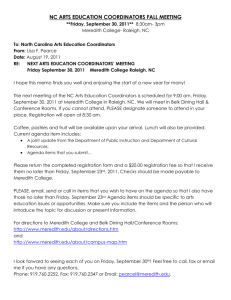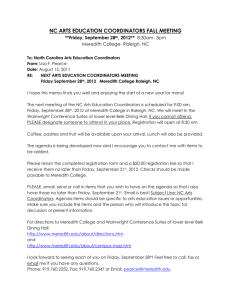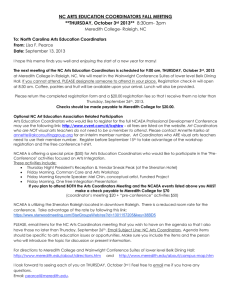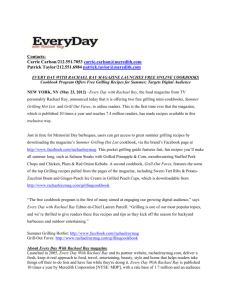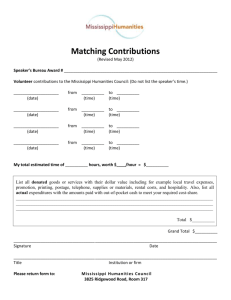ames_meredith_magazine__
advertisement
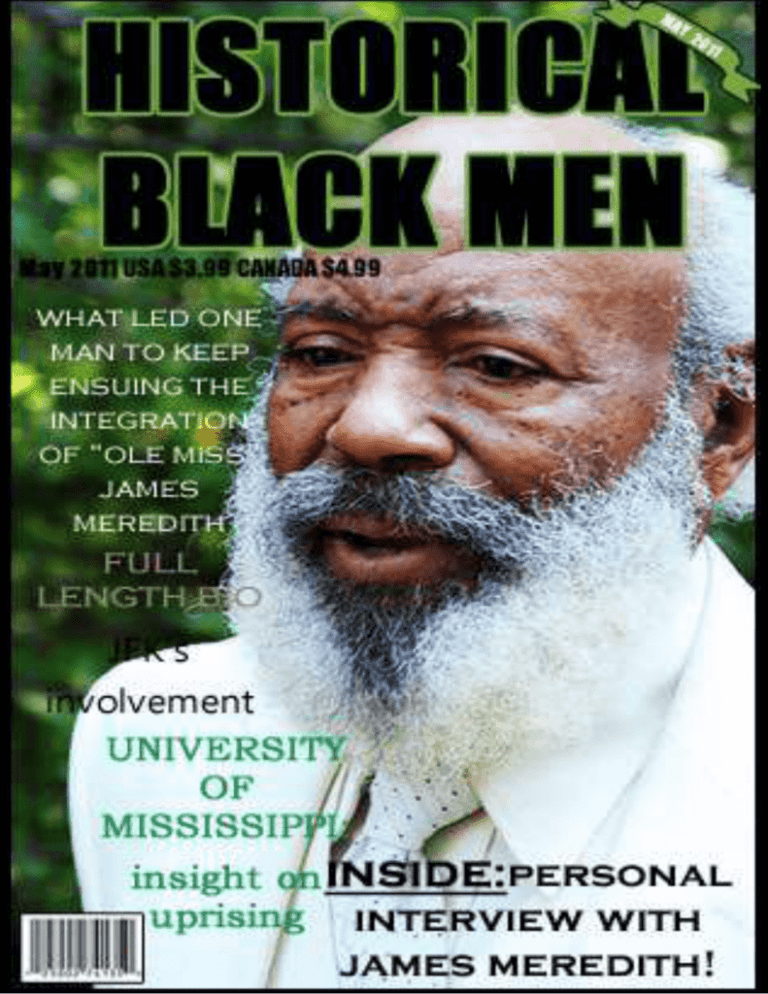
CONTENTS Credits —pg.3 James Meredith Biography— pgs 4-5 The Struggle: Personal Interview with James Meredith —pgs 7-9 Word Search — pg. 10 Pop Quiz —pg. 12 University of Mississippi: Insight on Uprising — pg. 13 2|HBM CREDITS Doyle, William. An American Insurrection: The Battle of Oxford Mississippi, 1962. New York: Doubleday, 2001. Holland, Gini. A Cultural History of the United States: The 1960s. San Diego, CA: Lucent Books, 1999. Meredith, James. Three Years in Mississippi. Bloomington: Indiana University Press, 1966. Rasmussen, R. Kent. Farewell to Jim Crow: The Rise and Fall of Segregation in America. New York, NY: Library of African-American History, 1977. Available from: http://www.therainbowcollective.com/?tag=james-meredith 20 May 2011. James Meredith. 2008. Photograph. BBC World Service, Mississippi. Flickr.com. British Broadcasting Corporation, 28 Sept. 2008. Web. 20 May 2011. <http://www.flickr.com/photos/bbcworldservice/2886142008/in/photostream/>. Meredith. Photograph. IUB, Bloomington. Indiana.edu. 27 May 2005. Web. 20 May 2011. <http://www.indiana.edu/~ocmhp/052705/text/events.shtml>. Photograph. AMC. Amctv.com. Carolyn Koo, 16 Oct. 2008. Web. 25 May 2008. <http://blogs.amctv.com/mad-men/2008/10/james-meredith.php>. Photograph. History Learning Site. Web. 20 May 2011. <http://www.historylearningsite.co.uk/james_meredith.htm>. 3|HBM “My objective in this war was total victory: victory over discrimination, oppression, the unequal application of the law, and, most of all, over ‘White Supremacy’ and all of its manifestations.” (Meredith, Three Years in Mississippi.) JAMES MEREDITH BIO Born on June 25th, 1933 in Kosciusko, Mississippi, an American activist who gained respect and recognition became the first African American student at the University of Mississippi in Oxford in 1962. To begin, in 1951 to 1960 Meredith served in the U.S Air force. In 1960, Meredith attended Jackson State College when he was attempting to become the first African American to gain admission to the University of Mississippi. In 1961, he was rejected twice. By the middle of 1961, he filed a complaint to the District Court. The court denied his appeal because of his color. On appeal, the Fifth Judicial Circuit Court flipped their 4|HBM ruling. Two to one judges decided that Meredith was definitely rejected because of his race and Mississippi was maintaining a policy of educational segregation. He won his case with great assistance from the NAACP (National Associates for the Advancement of Colored People). In the fall of 1962, attorney general, Robert F. Kennedy, called for thirty-thousand federal marshals to protect Meredith from threats of being lynched, while he registered for classes. In 1963, he graduated and wrote a book about his experience called “Three Years in Mississippi (1966)”. He continued to seek more knowledge and participated in activism. Meredith attended the University of Ibadan in Nigeria (1964-1965) and Columbia University (1966-1968). In June of 1966, he began a protest march called “March Against Fear”, which took place from Memphis, TN to Jackson, MS. That same particular, Meredith was shot by a sniper. Many of civil rights leaders resumed the march, which he was able to rejoin after hospitalization. In the late 1960’s, he ceased being an activist and became a stockbroker. He also joined the Republican Party and made many attempts to be elected into Congress. Most importantly, he opposed economic sanctions against South Africa and made the birthday of Martin Luther King a national holiday. 5|HBM 6|HBM Q&A THE STRUGGLE: UPCLOSE INTERVIEW WITH JAMES MEREDITH Although we know that James Meredith was the first African American to attend an all white school, University of Mississippi, we have yet to acknowledge the immense impact and struggle he went through to achieve his goal.___________________________ HBM: “Mr. Meredith, what was the primary factor that led you to try and enroll into the University of Mississippi?” Meredith:”As a child, it had always been my dream to enroll and register as a student at the school, University of Mississippi, where no blacks were allowed to attend. After leaving the armed forces and excelling at Jackson State I had the desire to attend one of the top universities in America. Their faculty held advanced degrees, the school produced more Rhode 7|HBM scholars than almost every other Southern University, and they had a wonderful campus. In addition, my objective was absolute destruction of white supremacy, and it was time for me to take direct action. I should not have been denied the privilege of getting an education because of the color of my skin.” HBM: “How did you feel when applying to this school and when you were initially rejected by the University of Mississippi, what were your thoughts?” Meredith:”Finally, I was making this move in what I considered the interest of and for the benefit of: (1) my country, (2) my race, (3) my family, and (4) myself. I was familiar with the probable difficulties involved in such a move as I was undertaking and was fully prepared to pursue it all the way to a degree from the University of Mississippi. When I was rejected, I was not surprised. I knew this was going to be a very hard struggle but that did not stop me from pursuing it. The primary tactics that I chose were to act secretly and quickly and to capitalize on public concern and public opinion.”1 HBM: “What made you go about the situation in this manner? Why did you feel that it was necessary to get the federal government involved?” Meredith:”I knew I would not have been able to achieve this task on my own. I felt that the federal government needed to assist me because they had the power and prestige to enforce their positions and insure the full rights of citizenship for African Americans”2 HBM:” When the trial was over and the Supreme Court Judge ruled that you should be admitted to the University of Mississippi, how did you feel? And what was the effect?” Meredith:”I felt very accomplished, but also still unsatisfied because I knew that this wasn’t the end of my battle. Just because I was allowed entry into the school, did not mean that I would still be treated with respect by my classmates and teachers. I was prepared to face all the negativity from all the white people that wished to see me fail.” HBM: “How did you feel when regional segregationist Governor Ross Barnett and hundreds of state police blocked you from entry?” Meredith: “I was shocked.” HBM: “Did you expect this ferocious white uprising to occur?” 1 Meredith, James. Three Years in Mississippi . Bloomington: Indiana University Press, 1966. 2 Ibid 1 (Meredith, 61) 8|HBM Meredith: “No. I could not believe that all of this chaos erupted only from my determination to pursue an education. All the white folks wanted to see me fail and would go to any extreme to get me to leave.” HBM: “What role did President Kennedy play in your enrollment into the school? Meredith:”President Kennedy provided a great atmosphere for the development of this situation and if he was not the president at this time, I believe that this matter would have been even more difficult to go upon.” HBM:”What was it like the first few months of attendance at Ole Miss?” Meredith:”It was terrible.” HBM:”As a result of your determination, perseverance, and strong will do you think that you achieved your goal of equality and “total destruction” of white supremacy?” Meredith:”Yes. It was a very long road to achieving my goal and my exit from Mississippi on August 18, 1963, marked the end of my three years in that state; it marked the end of this particular stage of my struggle to break the system of ‘White Supremacy’ and to carry out my “Divine Responsibility.” 3 HBM: “What impact do you think you had amongst other African Americans at that time? Meredith:”I’m proud to say that I had a great impact ad influenced many leaders, specifically Dr. Martin Luther King.” 3 (Meredith, 328) 9|HBM 10 | H B M 11 | H B M ________________POP QUIZ!! Directions: Based on the information you read on James Meredith, circle the best answer choice that you think is correct. 1.) When was James Meredith shot? A. July 1967 C. June 1967 B. June 1966 D. August 1966 2.) What holiday did he establish? A. St. Patrick’s Day B. Memorial Day C. Black History Month D. MLK Day 3.) What did he name his memoir? A. “March Against Fear” B. “Three Years in Mississippi” C. “Educational Segregation” D. “Rejection” 4.) Who blocked Meredith from entry into the University of MS? A. J.F Kennedy C. Ross Barnett B. NAACP D. Malcolm X 5.) J.F Kennedy played a role against Meredith’s enrollment. TRUE OR FALSE 6.) 30,000 marshals protected Meredith from being assassinated. TRUE OR FALSE 12 | H B M ANSWERS: 1.) B 2.) D 3.)B 4.) C 5.) F 6.) T UNIVERSITY OF MISSISSIPPI: INSIGHT ON UPRISING The University of Mississippi was one of the most segregated schools in the nation. They tried their hardest to maintain White supremacy and deny the rights of African Americans but were stopped in the pursuits of James Meredith. His actions and court win gave him gratification across the world and these sparked fumes amongst the citizens of Mississippi. A terrible uprising out broke and several people were killed. University of Mississippi, “Ole Miss”, was very intuitive in their power to break Meredith down. Governor Barnett, along with hundreds of state police and thousands of students/civilians physically blocked him from entry. John F. Kennedy had to order 30,000 combat troops to protect Meredith from being assassinated. 13 | H B M
